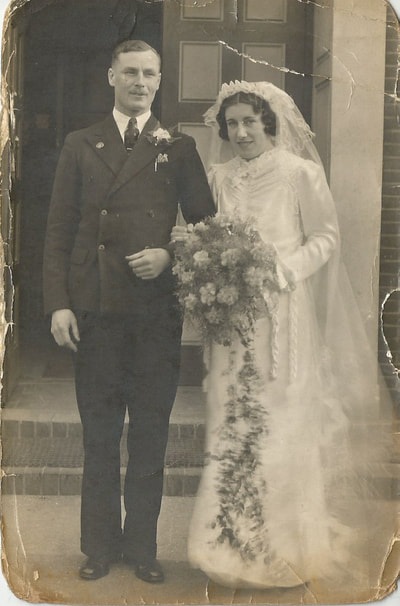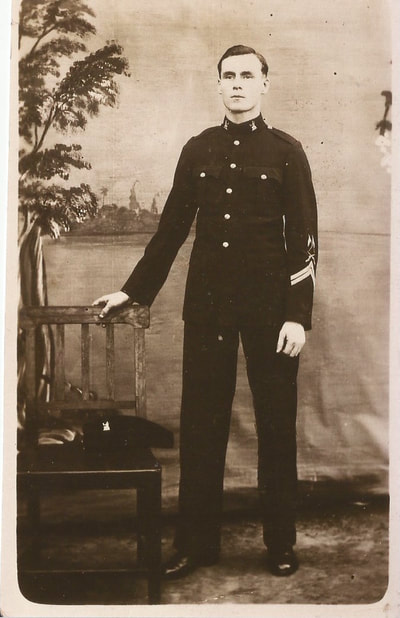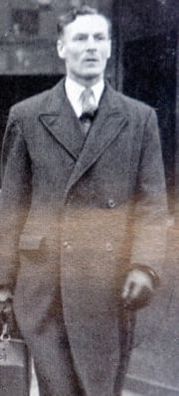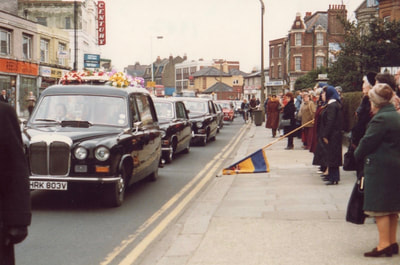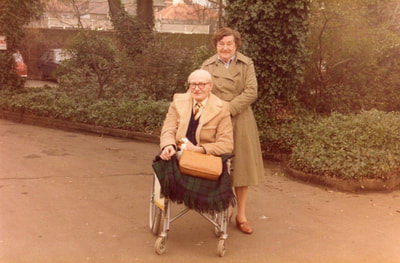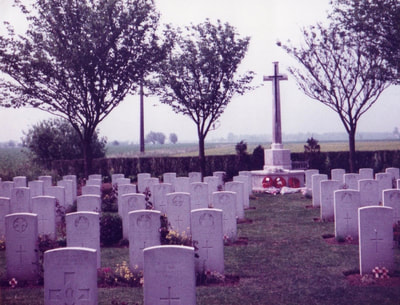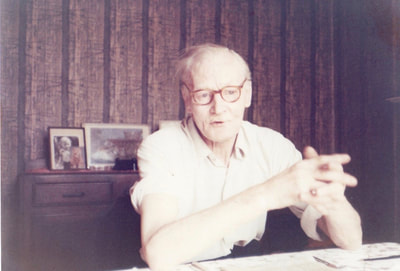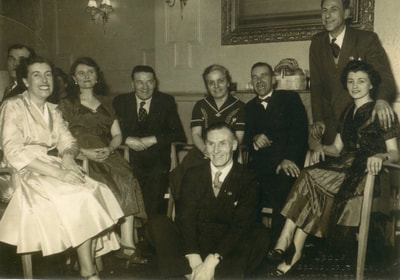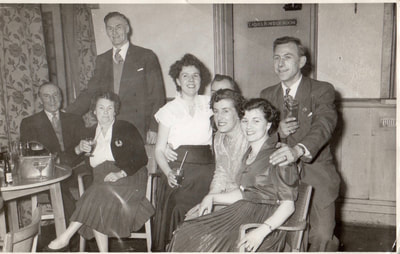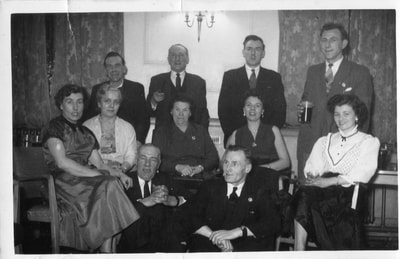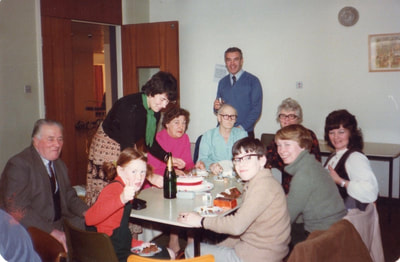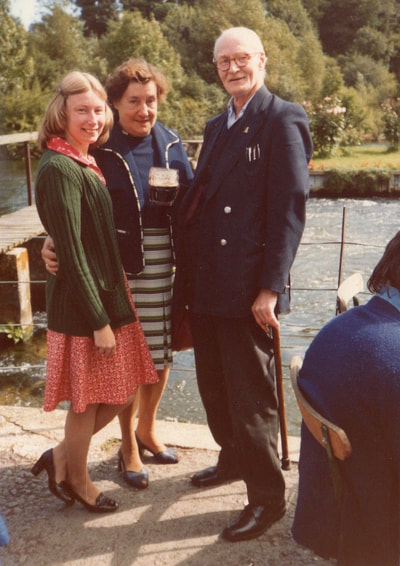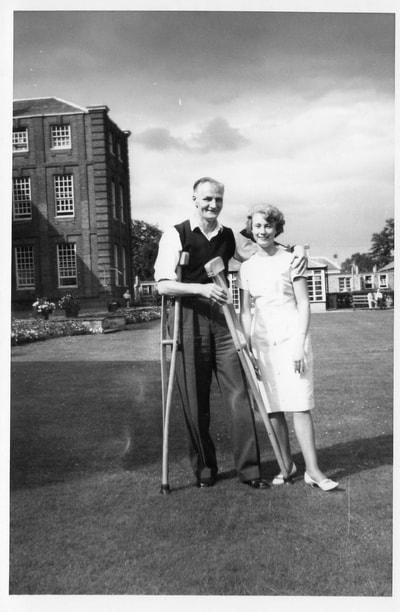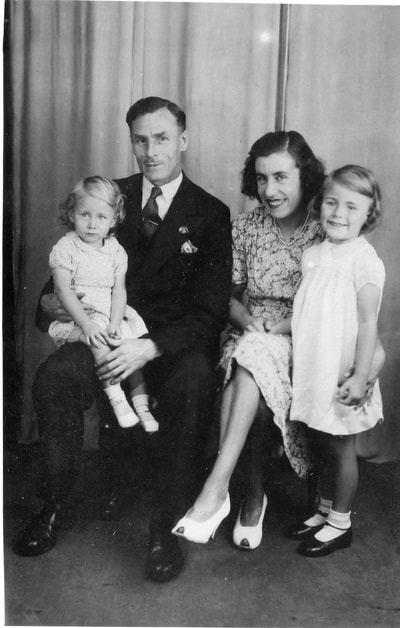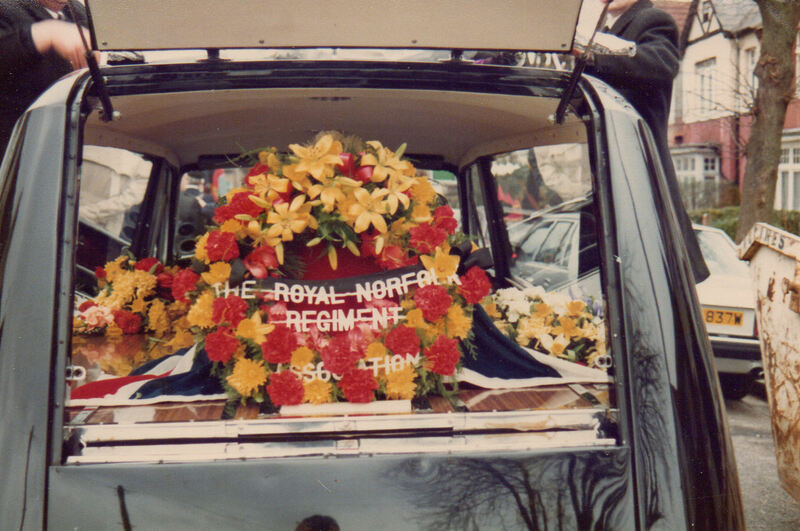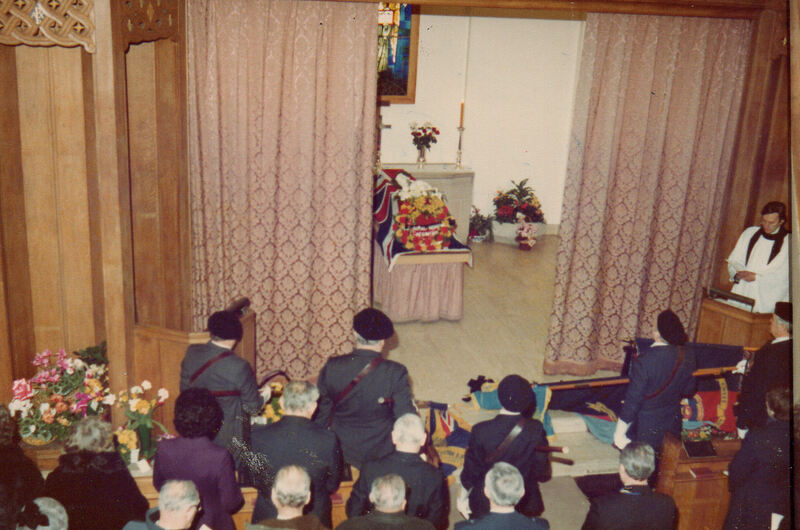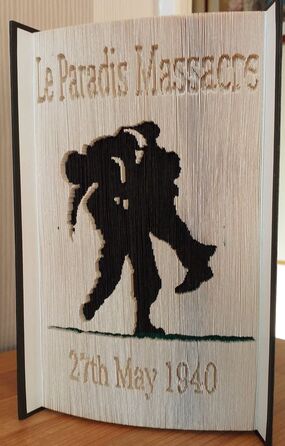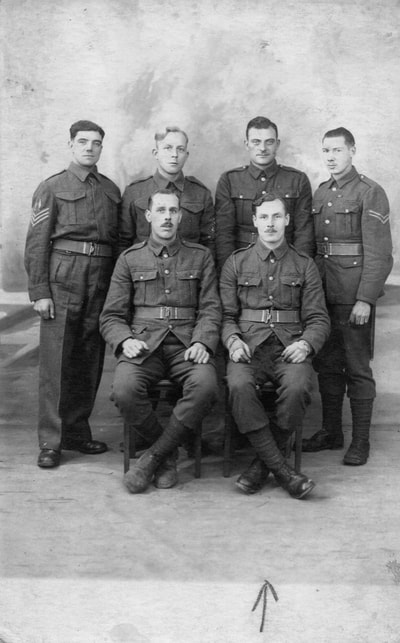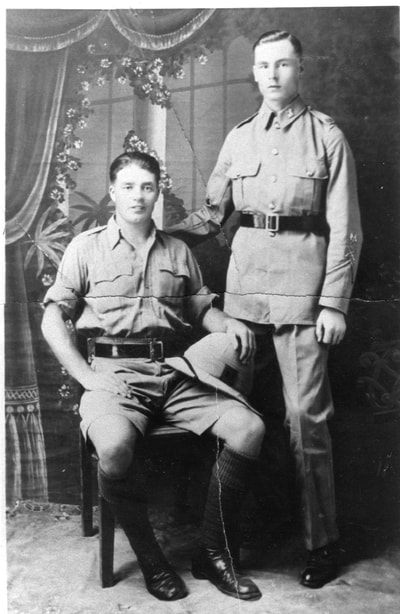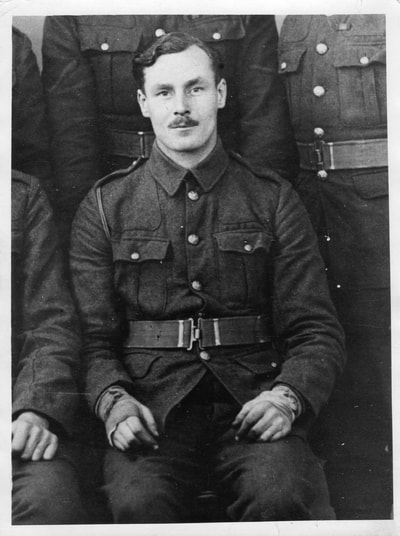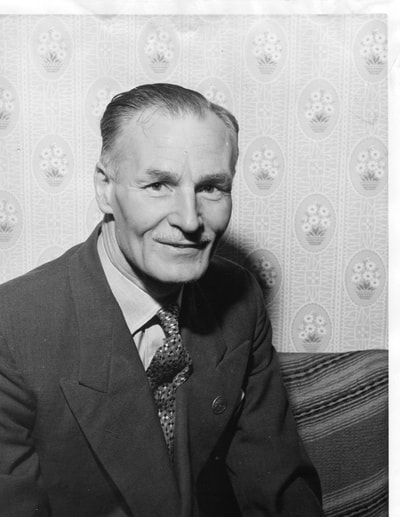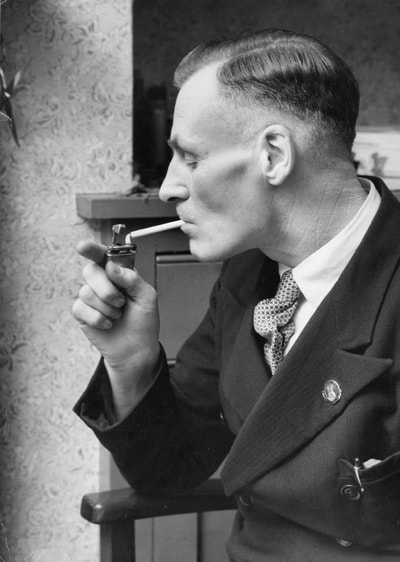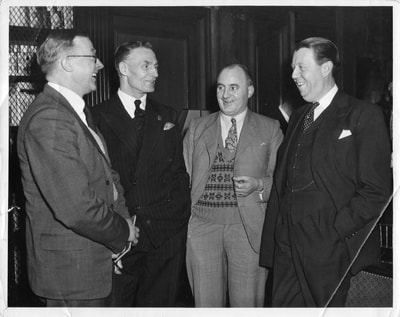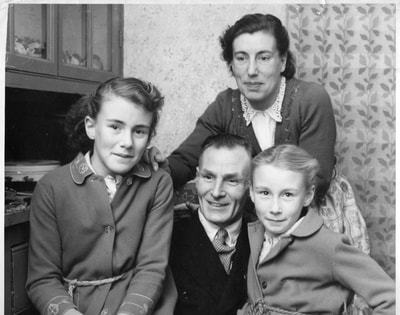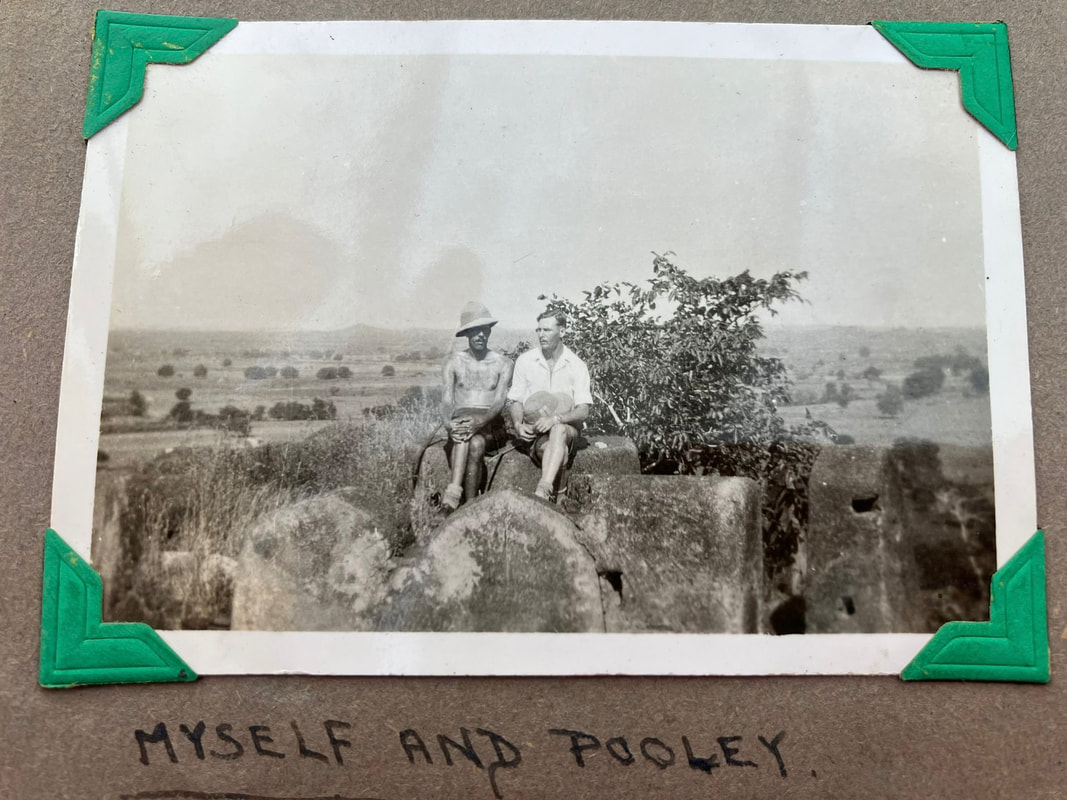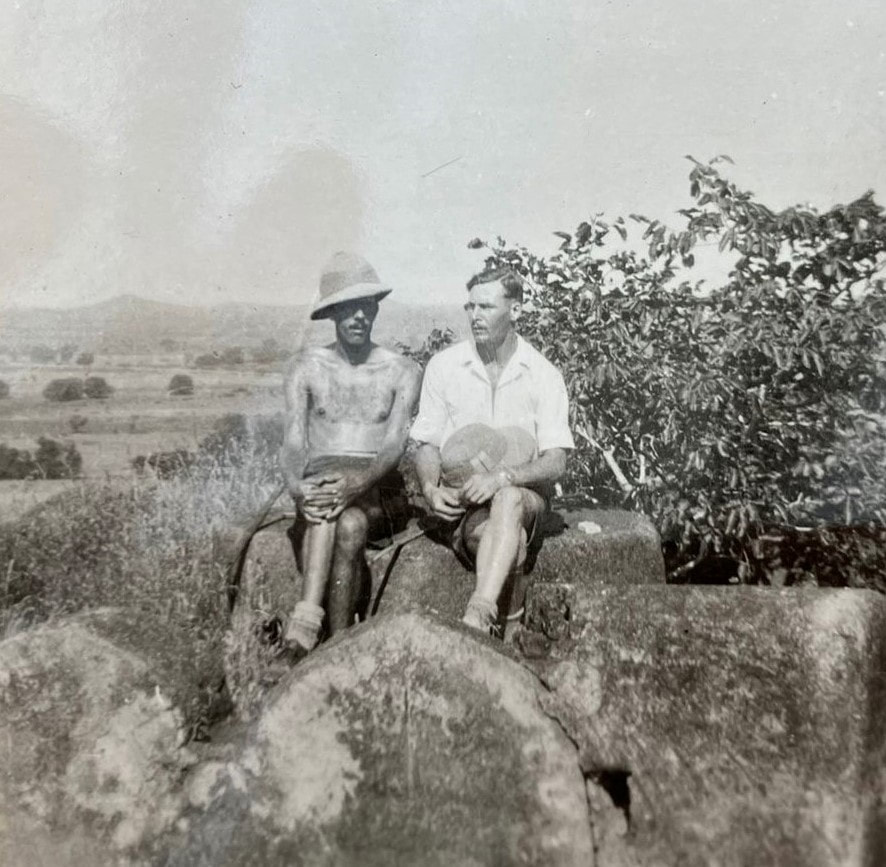Private Bert Pooley
Two soldiers survived the massacre - Privates William "Bill" O'Callaghan and Albert "Bert" Pooley. This section of the web site looks at the life of Bert Pooley.
The photographs above come from the collection belonging to Jeannette and Greg Hawkes and are reproduced with their permission. Jeannette is the daughter of Bert Pooley. Top row - Bert and Connie Pooley on their wedding day and Bert in uniform. Row two - Bert at the trial of Fritz Knoechlein and members of the public line the route of Bert's funeral in Southall, London. Row three - Bert and Connie Pooley and Berts final resting place where his ashes were placed in the churchyard of Le Paradis. Row four - Bert on his own and Bert with family and friends. Row five - Bert with more shots of friends and family. Row six - Bert and friends and family and Bert with wife Connie and daughter Jeannette. Row seven - Bert with Jeannette and Bert and Connie with their two daughters, Jeannette and Pat. The final two pictures of Bert's funeral are from the collection of Bob Brown and reproduced with the kind permission of Bob and his family.
Bert was one of only two survivors of the massacre at Le Paradis. We spoke to Bert's daughter Jeannette Hawkes and below are some of her memories of her father.
Jeannette was born in 1946 – just under six years after her father survived the massacre. She has few memories of Bert talking about either the massacre or the war (this is something borne out by Bill O’Callaghan’s son Dennis who says that his father rarely if ever talked about the war).
Jeannette does remember travelling to Normandy as a family in order to visit the people who helped him survive.
She remembers her father as a very particular man:
“He was always very smart and took a pride in his appearance. He also made sure myself and my sister were smart. On one occasion he wouldn’t take us out because our socks appeared dirty, they were only slightly worn ” she said.
Any task Bert undertook would be completed within the time lines he set himself , regardless of obstacles which presented themselves. He would never deviate from his objectives even if it meant leaving his family short of cash to travel to France under the guise of thanking persons who looked after him when he was really in pursuit of those guilty of the atrocity. One part of his service life that Bert did talk about to his children was his time in India before the war. He was proud of his service there as Jeannette explained.
"He had a beautiful album of photos which fascinated myself and my sister. These included pictures of the Taj Mahal and other landmarks.” Sadly the book of photographs was lost many years ago.
Jeannette also remembers her father as a competent lightweight boxer despite being over 6 ft tall.
After the war Bert worked in Hayes Post Office. Then he moved closer to home in Southall Post Office were he was in charge of the 'telegram boys'. His position was Postman Higher Grade.
Bert was born in Southall, London, on 28th January, 1912, the youngest of four children with siblings Sid, Maud and Chris. He was the son of John Christopher and Elizabeth Pooley.
His mother brought the four children up on her own as his father had left them.
They lived in Woodlands Road next door to a young lady by the name of Connie Judd whom he was later to marry. His eldest daughter Pat was born in 1944 and Jeannette, named after a young French girl who used to visit Bert whilst he was in Bethune Hospital, was born two years later in 1946.
Jeannette remembers sitting round a circular table in the winter months with the whole family doing jigsaw puzzles. She also remembers her father having a bad leg but still cycling to his work at Southall Post Office.
Jeannette refers to her father as “a drinking man” which is hardly surprising considering what he went through and saw.
“I am sure he started drinking to kill the pain,” she said.
He was also a heavy smoker, making his own roll ups and lighting them with a lighter he borrowed from a fellow soldier Nobby Clark and which he was never able to return. The lighter remained his most treasured possession but has now been lost.
Bert was also a keen newspaper reader, reading the Daily Telegraph from cover to cover.
“He certainly had opinions on everything but he was also a good listener but he didn’t have patience with people he considered to be idiots,” Jeannette added.
Jeannette’s husband Greg first met Bert in 1971 when he started going out with Jeannette.
“Bert treated me very well. I knew nothing about what he had gone through apart from being aware he had some problems connected with the war. He was always very polite and quite pleasant,” Greg said.
Gradually Jeannette and Greg, who married in 1972, began to piece together bits and pieces of Bert’s life.
Bert spent almost four years in hospital in France at Bethune as a prisoner-of-war and was eventually repatriated to the UK in 1943 as part of a prisoner exchange organised through the Red Cross.
During his time in French hospitals, Connie was told that Bert was “missing presumed dead”, but she never accepted that and believed he would return alive.
“My mum always said she knew he wasn’t dead. She had a vision that he was being cared for by a tall woman. It turned out that in hospital he was looked after by a nun – Sister Laurence- who was over 6ft tall,” Jeannette said. Sister Laurence was sentenced to death but survived after the war into her old age in her native Ireland (see our separate section on Sister Laurence).
Back in the UK Bert’s leg, which had been shattered by German bullets, became badly infected (a number of sources state that Bert had his leg amputated in France but Jeannette is sure it was in Roehampton).
“There was often a terrible smell in the house. When I was 14 or 15 he asked me to pour peroxide into the hole in his leg as he couldn’t face doing it himself. I poured it in and everything seemed to bubble up. I think it was his last effort to keep his leg and stop the gangrene from spreading. He always used to say ‘I came into the world with two legs and I’m going out with two'".
Permission to amputate his leg was given in hospital by Connie. “It saved his life but I’m not sure he ever forgave her. There is no doubt the leg was full of gangrene. He was in terrible pain from the leg and stomach problems caused by ulcers. Eventually he had to have his other leg amputated as well,” Jeannette said.
Bert’s stomach ulcers were probably a result of eating raw potatoes and drinking muddy water at Le Paradis. Back in the UK he had a well-controlled diet and ate simple food with fish and mash being a particular favourite.
Despite his experiences, Bert always wore his Norfolk Regiment badge with pride and he belonged to the British Limbless Ex-Servicemen’s Association (BLESMA)* and the whole family regularly went to events and dances held by the Royal British Legion.
As is illustrated elsewhere on this website, Bert was utterly determined to right the wrong of atrocities suffered by his comrades. Jeannette was but a few days old and Pat two, when Bert decided to go back to France in spite of his extremely poor health.
“He was a very tenacious man. When he set his mind on doing something, nothing would stop him. It didn’t matter how much pain he was in he would carry things through. Even if he was walking down the garden at home he would pick weeds up as he went along and he told myself and Pat that if we went down the garden we should never return empty handed. He had plenty of determination and grit. I think at times my parents had a difficult relationship and our upbringing was very strict. He certainly kept us on the straight and narrow and I think there is a lot of him in me. We were certainly brought up to be hard-working and honest and we knew never to cross the line."
Bert loved animals and kept cats and a bird. This prompted an amusing story that has stayed in Jeannette’s memory ever since.
“He hated wasting food and that certainly came from his awful experience at Le Paradis. We had a budgerigar and one day it flew into a bowl of custard. Dad picked it out, washed it under the tap and then insisted we ate the custard, which we did.”
“In my early years there were times I hated him but when I came to understand the things he went through, that feeling left me. He didn’t chose the life he had. I know he had nightmares. My mother always said that the man who came back from the war wasn’t the man that had gone to war.”
Jeannette said that a number of years ago she read a novel by Catrin Collier: “It just seemed like another book and it took a while before I realised it was about my dad.” (she contacted the author who promised to acknowledge this on the reprint).
Jeannette said that Bert was “proud of his two girls”.
“From the age of two we went on holiday to Bournemouth every year. We stayed with two sisters and they had a beach hut. Dad saved up all year for this trip and when he became too ill to go himself he still sent the family. We were one of the few families in the area who had an annual holiday. I also remember him making me a bike out of various bits of scrap he had been given. He painted it maroon and put a brown beret over the saddle. Dad told me to always carry a plastic bag when it rained to stop the beret being soaked."
A further set back to Bert’s health came from one of the Bournemouth holidays when he joined his daughters for a game of beach ball in the sea. Whilst jumping up and down he impaled his leg at the entry of the bullet wound on a piece of angle iron which was part of the wartime sea defences.
“There was blood everywhere and he was skewered and couldn’t move. Luckily a fellow holiday maker came to his aid, and then rang for an ambulance” Jeannette said.
Bert’s pride in his family was shown by the fact that he always kept a family photograph in his wallet.
Bert’s last wish was to have his ashes buried along with the bodies of those he referred to as “my boys” in the cemetery at Le Paradis, a request the Pooley family were able to honour. Bert’s ashes are now at the foot of the remembrance cross (see our pilgrimages section for more details of the interment of Bert's ashes).
This request was carried out in June 1982 with the event being covered in the Norfolk based newspaper The Eastern Daily Press which has the following to say:
"Albert Pooley's resting place is now in so peaceful a spot that it is almost impossible to imagine that these same acres, so similar in many ways to the open Norfolk countryside, witnessed some of the most savage fighting of the second world war."
* Now known as Blesma, the Limbless Veterans.
Below are more photographs from the Bert Pooley family album. They are Top Row left - Bert (seated front) with colleagues. Top Row middle - Bert (standing) with brother Chris. Top Row right - Bert in uniform. Middle Row left - Bert in 1950. Middle Row middle - Bert with Nobby Clarke's lighter. Middle Row right - Bert with Dennis O'Callaghan. Bottom Row - Bert with wife Connie and daughters Pat and Jeannette.
Jeannette was born in 1946 – just under six years after her father survived the massacre. She has few memories of Bert talking about either the massacre or the war (this is something borne out by Bill O’Callaghan’s son Dennis who says that his father rarely if ever talked about the war).
Jeannette does remember travelling to Normandy as a family in order to visit the people who helped him survive.
She remembers her father as a very particular man:
“He was always very smart and took a pride in his appearance. He also made sure myself and my sister were smart. On one occasion he wouldn’t take us out because our socks appeared dirty, they were only slightly worn ” she said.
Any task Bert undertook would be completed within the time lines he set himself , regardless of obstacles which presented themselves. He would never deviate from his objectives even if it meant leaving his family short of cash to travel to France under the guise of thanking persons who looked after him when he was really in pursuit of those guilty of the atrocity. One part of his service life that Bert did talk about to his children was his time in India before the war. He was proud of his service there as Jeannette explained.
"He had a beautiful album of photos which fascinated myself and my sister. These included pictures of the Taj Mahal and other landmarks.” Sadly the book of photographs was lost many years ago.
Jeannette also remembers her father as a competent lightweight boxer despite being over 6 ft tall.
After the war Bert worked in Hayes Post Office. Then he moved closer to home in Southall Post Office were he was in charge of the 'telegram boys'. His position was Postman Higher Grade.
Bert was born in Southall, London, on 28th January, 1912, the youngest of four children with siblings Sid, Maud and Chris. He was the son of John Christopher and Elizabeth Pooley.
His mother brought the four children up on her own as his father had left them.
They lived in Woodlands Road next door to a young lady by the name of Connie Judd whom he was later to marry. His eldest daughter Pat was born in 1944 and Jeannette, named after a young French girl who used to visit Bert whilst he was in Bethune Hospital, was born two years later in 1946.
Jeannette remembers sitting round a circular table in the winter months with the whole family doing jigsaw puzzles. She also remembers her father having a bad leg but still cycling to his work at Southall Post Office.
Jeannette refers to her father as “a drinking man” which is hardly surprising considering what he went through and saw.
“I am sure he started drinking to kill the pain,” she said.
He was also a heavy smoker, making his own roll ups and lighting them with a lighter he borrowed from a fellow soldier Nobby Clark and which he was never able to return. The lighter remained his most treasured possession but has now been lost.
Bert was also a keen newspaper reader, reading the Daily Telegraph from cover to cover.
“He certainly had opinions on everything but he was also a good listener but he didn’t have patience with people he considered to be idiots,” Jeannette added.
Jeannette’s husband Greg first met Bert in 1971 when he started going out with Jeannette.
“Bert treated me very well. I knew nothing about what he had gone through apart from being aware he had some problems connected with the war. He was always very polite and quite pleasant,” Greg said.
Gradually Jeannette and Greg, who married in 1972, began to piece together bits and pieces of Bert’s life.
Bert spent almost four years in hospital in France at Bethune as a prisoner-of-war and was eventually repatriated to the UK in 1943 as part of a prisoner exchange organised through the Red Cross.
During his time in French hospitals, Connie was told that Bert was “missing presumed dead”, but she never accepted that and believed he would return alive.
“My mum always said she knew he wasn’t dead. She had a vision that he was being cared for by a tall woman. It turned out that in hospital he was looked after by a nun – Sister Laurence- who was over 6ft tall,” Jeannette said. Sister Laurence was sentenced to death but survived after the war into her old age in her native Ireland (see our separate section on Sister Laurence).
Back in the UK Bert’s leg, which had been shattered by German bullets, became badly infected (a number of sources state that Bert had his leg amputated in France but Jeannette is sure it was in Roehampton).
“There was often a terrible smell in the house. When I was 14 or 15 he asked me to pour peroxide into the hole in his leg as he couldn’t face doing it himself. I poured it in and everything seemed to bubble up. I think it was his last effort to keep his leg and stop the gangrene from spreading. He always used to say ‘I came into the world with two legs and I’m going out with two'".
Permission to amputate his leg was given in hospital by Connie. “It saved his life but I’m not sure he ever forgave her. There is no doubt the leg was full of gangrene. He was in terrible pain from the leg and stomach problems caused by ulcers. Eventually he had to have his other leg amputated as well,” Jeannette said.
Bert’s stomach ulcers were probably a result of eating raw potatoes and drinking muddy water at Le Paradis. Back in the UK he had a well-controlled diet and ate simple food with fish and mash being a particular favourite.
Despite his experiences, Bert always wore his Norfolk Regiment badge with pride and he belonged to the British Limbless Ex-Servicemen’s Association (BLESMA)* and the whole family regularly went to events and dances held by the Royal British Legion.
As is illustrated elsewhere on this website, Bert was utterly determined to right the wrong of atrocities suffered by his comrades. Jeannette was but a few days old and Pat two, when Bert decided to go back to France in spite of his extremely poor health.
“He was a very tenacious man. When he set his mind on doing something, nothing would stop him. It didn’t matter how much pain he was in he would carry things through. Even if he was walking down the garden at home he would pick weeds up as he went along and he told myself and Pat that if we went down the garden we should never return empty handed. He had plenty of determination and grit. I think at times my parents had a difficult relationship and our upbringing was very strict. He certainly kept us on the straight and narrow and I think there is a lot of him in me. We were certainly brought up to be hard-working and honest and we knew never to cross the line."
Bert loved animals and kept cats and a bird. This prompted an amusing story that has stayed in Jeannette’s memory ever since.
“He hated wasting food and that certainly came from his awful experience at Le Paradis. We had a budgerigar and one day it flew into a bowl of custard. Dad picked it out, washed it under the tap and then insisted we ate the custard, which we did.”
“In my early years there were times I hated him but when I came to understand the things he went through, that feeling left me. He didn’t chose the life he had. I know he had nightmares. My mother always said that the man who came back from the war wasn’t the man that had gone to war.”
Jeannette said that a number of years ago she read a novel by Catrin Collier: “It just seemed like another book and it took a while before I realised it was about my dad.” (she contacted the author who promised to acknowledge this on the reprint).
Jeannette said that Bert was “proud of his two girls”.
“From the age of two we went on holiday to Bournemouth every year. We stayed with two sisters and they had a beach hut. Dad saved up all year for this trip and when he became too ill to go himself he still sent the family. We were one of the few families in the area who had an annual holiday. I also remember him making me a bike out of various bits of scrap he had been given. He painted it maroon and put a brown beret over the saddle. Dad told me to always carry a plastic bag when it rained to stop the beret being soaked."
A further set back to Bert’s health came from one of the Bournemouth holidays when he joined his daughters for a game of beach ball in the sea. Whilst jumping up and down he impaled his leg at the entry of the bullet wound on a piece of angle iron which was part of the wartime sea defences.
“There was blood everywhere and he was skewered and couldn’t move. Luckily a fellow holiday maker came to his aid, and then rang for an ambulance” Jeannette said.
Bert’s pride in his family was shown by the fact that he always kept a family photograph in his wallet.
Bert’s last wish was to have his ashes buried along with the bodies of those he referred to as “my boys” in the cemetery at Le Paradis, a request the Pooley family were able to honour. Bert’s ashes are now at the foot of the remembrance cross (see our pilgrimages section for more details of the interment of Bert's ashes).
This request was carried out in June 1982 with the event being covered in the Norfolk based newspaper The Eastern Daily Press which has the following to say:
"Albert Pooley's resting place is now in so peaceful a spot that it is almost impossible to imagine that these same acres, so similar in many ways to the open Norfolk countryside, witnessed some of the most savage fighting of the second world war."
* Now known as Blesma, the Limbless Veterans.
Below are more photographs from the Bert Pooley family album. They are Top Row left - Bert (seated front) with colleagues. Top Row middle - Bert (standing) with brother Chris. Top Row right - Bert in uniform. Middle Row left - Bert in 1950. Middle Row middle - Bert with Nobby Clarke's lighter. Middle Row right - Bert with Dennis O'Callaghan. Bottom Row - Bert with wife Connie and daughters Pat and Jeannette.
Follow the links below to read more files featuring Bert Pooley:
Bert's Affidavit for the trial of Fritz Knoechlein
Bert Pooley's cross examination at the trial of Fritz Knoechlein
Bert Pooley's statements after re-patriation.
Bert Pooley's Prisoner of War Timeline
Who was the Sister who looked after Bert in Hospital? We have details here.
Bert in The Media - After the war Bert Pooley was featured in numerous articles in local and national press. We use these to help build up an even more complete picture of the man.
Bert's Affidavit for the trial of Fritz Knoechlein
Bert Pooley's cross examination at the trial of Fritz Knoechlein
Bert Pooley's statements after re-patriation.
Bert Pooley's Prisoner of War Timeline
Who was the Sister who looked after Bert in Hospital? We have details here.
Bert in The Media - After the war Bert Pooley was featured in numerous articles in local and national press. We use these to help build up an even more complete picture of the man.
